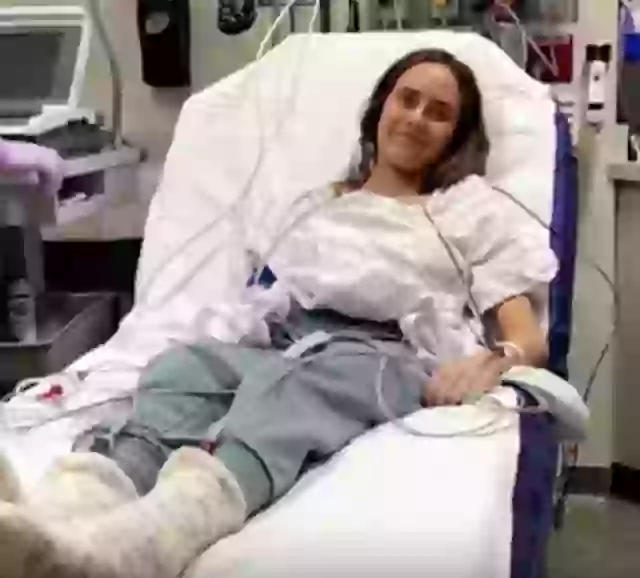A growing number of young people are being diagnosed with cancer, particularly colon cancer, and one recent story involving twin sisters has shed light on just how unpredictable and mysterious this disease can be. The heartbreaking case of Brinlee Luster, a 21-year-old from Utah who was diagnosed with stage 4 colon cancer, while her twin sister Mariela remained cancer-free, has sparked conversation in the medical community about the factors contributing to the sharp rise in cancer among individuals under 50.
In this particular case, both sisters shared the same genes, same home environment, and even the same daily routines. But their health took drastically different paths. The question everyone’s asking is: Why? What caused Brinlee to face such a life-altering diagnosis while her twin seemed untouched?

Dr. Mark Lewis, a respected cancer survivor and current director of gastrointestinal oncology at Intermountain Health, weighed in on this concerning phenomenon. With more cases emerging among people in their 20s, 30s, and 40s, Dr. Lewis emphasized that colon cancer is no longer an “old person’s disease.” In fact, according to him, approximately one out of every seven patients in his own practice battling colon cancer is under the age of 45—a statistic that would have seemed alarming just a generation ago.
He stressed that there’s no such thing as being “too young” for colon cancer anymore. Young people can, and clearly do, develop this illness. And the reasons may not be as straightforward as we think. Dr. Lewis suggested that a combination of factors, from hereditary risk to modern-day lifestyle influences, and even early exposure to certain medications, may all play a part.
One factor in particular that stood out in his explanation was the role of antibiotics, especially when taken during childhood and adolescence. While antibiotics are undeniably important in fighting infections, Dr. Lewis explained that they may also disrupt the gut microbiome—the community of bacteria that lives in the digestive system and plays a key role in health, immunity, and digestion.
When the balance of bacteria in the colon is altered over time, it could, he theorized, increase the long-term risk for colon cancer. This insight has prompted doctors to be increasingly cautious about prescribing antibiotics to young people unless absolutely necessary.
But it’s not just about medication. Diet, stress levels, exercise, and even the environment we grow up in may influence whether or not someone develops cancer. Despite how similar twins may be genetically, small variations in life experiences can have massive consequences over time.
In the case of Brinlee and Mariela, it’s still unclear what exactly tipped the scales. Neither has publicly confirmed whether one took more antibiotics or had different medical treatments growing up. But what is clear is that Brinlee’s symptoms were not immediately taken seriously—by herself or by her doctors.
At just 21, Brinlee began experiencing severe abdominal cramping, extreme fatigue, and an overall feeling that something was “off.” But at first, her discomfort was chalked up to more common causes. Some doctors believed her symptoms could be the result of her birth control, or possibly irritable bowel syndrome—conditions often diagnosed in young women.

Even Brinlee herself didn’t think the pain was anything serious. She told KSL TV that she initially blamed it on stress. With her wedding approaching and college graduation just around the corner, she figured the emotional whirlwind of adult life was taking its toll. “I just thought, you know, I’m stressed, I’m planning my wedding, I’m about to graduate college, there’s a lot of changes,” she said.
Unfortunately, the pain didn’t go away. In fact, it worsened. Eventually, Brinlee decided to push for more answers and underwent a colonoscopy—a test not often recommended for someone her age. That’s when she received the devastating news: she had colon cancer, and it was already at stage 4.
Her life quickly changed course. Over the following months, Brinlee would endure 30 rounds of chemotherapy—a grueling treatment regimen, both physically and emotionally draining. But her determination and strength prevailed, and she is now believed to be cancer-free. A hard-fought battle that’s given her a new perspective on health and life.
This diagnosis didn’t just affect her—it became a wake-up call for her entire family, especially Mariela, her twin. Motivated by her sister’s experience, Mariela went for a colonoscopy herself. During the screening, doctors found polyps, small growths that could potentially turn cancerous if left untreated. Thanks to early detection, those were removed in time.
Mariela now credits Brinlee with saving her life. “I like to think that she really did save my life in a way because I was headed down that route,” she said. Her words are more than just touching—they highlight the critical importance of listening to your body, advocating for your health, and pushing for answers, even when you’re told you’re “too young” to worry.

This story underscores a sobering truth: colon cancer isn’t something only older people need to fear anymore. The rules have changed. And if you’re experiencing signs like persistent abdominal pain, fatigue, changes in bowel habits, or anything that just doesn’t feel right—don’t dismiss it. Talk to your doctor. Ask the hard questions. Insist on real answers.
As Dr. Lewis put it best, “If you are willing to talk to your doctor about your gut health, I promise you we are going to be better at finding colon cancer sooner.” And finding it early could be the difference between life and death.